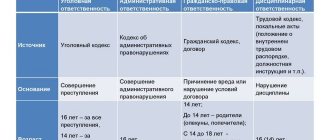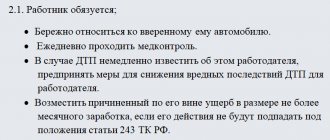About the types of disciplinary responsibility
Here we must rely on the provisions of Article 192 of the Labor Code of the Russian Federation. It states that in case of any violation by an employee, the employer has the right to the following reactions:
- Reprimands.
- Notes.
- Dismissals from work.
Some categories of workers and certain industries require additional types of disciplinary liability.
Dismissal as a punitive measure can only be used if it is permissible in accordance with current legislation or regulations. An exception is made for remote workers or those who manage enterprises. For them, it is allowed to agree on additional grounds for dismissal.
Some disciplinary actions have a limited duration. For example, they are removed 1 year after the discovery of the offense. But for this, the citizen must not have any other offenses during the specified period. At the request of the employee or immediate superior, punishments are allowed to be lifted earlier.
Statute of limitations for disciplinary offenses in the Ministry of Internal Affairs
In accordance with paragraph “c” of paragraph 7 of the Procedure for paying bonuses to employees of the internal affairs bodies of the Russian Federation, approved. By order of the Ministry of Internal Affairs of Russia dated December 19, 2011 No. 1257 (as amended by Order of the Ministry of Internal Affairs of Russia dated July 11, 2012 No. 684), bonuses are not paid to employees who have a disciplinary sanction of “severe reprimand”.
Local acts of the Employer, in particular provisions on remuneration or provisions on bonuses, may stipulate that employees with outstanding disciplinary sanctions are not subject to bonuses, which does not contradict current legislation and does not violate the rights of employees.
Legal regulation
There are separate provisions of the Labor Code that are devoted to disciplinary sanctions and their application in practice.
For example, part 1 of Article 192 of the Labor Code of the Russian Federation says that an employee, in principle, has the right to be held accountable if he has committed an offense. Parts 3 and 4 mention the periods during which such penalties can be applied.
Your own deadlines for applying penalties can be provided for in separate regulations developed for a particular company. But most employers try to adhere to the standard provisions of the Labor Code.
Commentary to Art. 193 Labor Code of the Russian Federation
1. When applying disciplinary sanctions, it is mandatory to simultaneously comply with the deadlines (from the day the offense was discovered and from the day it was committed), take into account the circumstances under which the offense was committed, the degree of its severity, and the employee’s previous behavior.
2. It is unacceptable to simultaneously apply several disciplinary sanctions to an employee for one disciplinary offense.
3. In the event of material damage being caused to the employer, it is possible to bring the employee to both disciplinary and financial liability at the same time (see commentary to Chapter 39 of the Labor Code of the Russian Federation).
4. If the employer refuses to familiarize himself with the order (instruction) on the application of a disciplinary sanction against signature, he draws up a corresponding act.
5. Disciplinary sanctions are imposed by the head of the organization or other officials who are granted such a right by the organization’s statutory documents.
6. Disciplinary measures should be distinguished from disciplinary measures (deprivation of bonus in whole or in part, reduction in the amount or non-payment of remuneration based on the results of work for the year - the so-called 13th salary - etc.) established in local regulations.
The procedure for bringing to disciplinary liability
Article 192 of the Labor Code of the Russian Federation describes in detail how to correctly apply disciplinary sanctions. There are several stages here, and at each of them the HR department should be especially careful:
- They start by recording the fact of the violation itself.
- A special act signed by the manager and several witnesses is needed when it comes to absenteeism or tardiness. Any guilty actions must be recorded using an act and similar evidence documents. If the pass is valid for more than one working day, then each of them is documented separately.
- If the employee is not at work at this time - due to vacation or sick leave, you need to wait until he appears. Otherwise, the imposition of penalties will not be legal.
- Next, they take an explanation in writing from the absent person himself.
- If the other party refuses to give an explanation, punishment can still be applied; prohibitions in the direction do not apply. An additional act is simply drawn up stating that the other party refused.
- Drawing up an order related to punishment.
- Entering the fact of a disciplinary sanction into a personal card in the T-2 form.
What period is established for bringing an employee to justice under the Labor Code of the Russian Federation?
Disciplinary liability has a statute of limitations. Article 193 of the Labor Code of the Russian Federation explains in great detail the actions of the employee and the employer regarding this difficult issue.
From the date of discovery of an illegal or violating labor discipline action, the statute of limitations of no more than a month must pass before the application of a disciplinary sanction. Otherwise, the employer will remain “out of business” and will not be able to punish the culprit.
There is also such a concept in the law as “the day the offense was committed.”
A disciplinary sanction can be applied no later than six months after the day the offense was committed, otherwise it cannot be imposed on the employee.
Thus, disciplinary liability is applied no later than 1 month from the date of discovery of the disciplinary offense and no later than 6 months from the date of its commission.
At the same time, if a person is “caught red-handed” during an inspection or audit, the employer has the right to apply punishment within a period of no later than two years after the commission of the offense.
If the employee worked conscientiously throughout the year after the penalty was imposed and did not make previous mistakes, the penalty will be lifted automatically.
When a person steps on the same “rake” again, the disciplinary process begins again against him, and the period for “automatic withdrawal” opens again - from the date of the new order for collection.
You can reduce the statute of limitations for disciplinary liability by making a request to your employer.
Sometimes the manager himself goes to meet the guilty employee halfway, relieving him of the burden of responsibility.
Attention! If an employee has committed one offense, then the employer has the right to impose only one penalty on him for it.
When does the time for applying punishment for a misdemeanor change?
The statute of limitations for disciplinary action is extended if the person is on sick leave or on vacation.
The concept of “vacation” in this case should be understood as all leaves regulated by law: annual, for study, without pay.
The fact is that there is a certain algorithm for bringing an employee to disciplinary liability and imposing penalties on him, according to which a corresponding order is issued: the offending employee must familiarize himself with this document personally.
A similar scheme also applies in cases where time is needed to take into account the opinions of the representative body of workers in accordance with Part 2 of Art. 82 Labor Code of the Russian Federation.
According to Part 6 of Art. 193 of the Labor Code of the Russian Federation, the employee is given a period of three days to familiarize himself with the boss’s order to impose a penalty, and the document must be signed.
This possibility is excluded if the person is on vacation or has issued a certificate of incapacity for work. In this case, he can familiarize himself with the order on the first day of going to work.
The employee may refuse to sign the document. Then, in the presence of witnesses, a corresponding act of refusal is drawn up.
The act must indicate the date, place, reason for drawing up, and list the witnesses who were present during the conversation about the proposal to indicate the reasons for this decision.
Controversial situations
The most difficult thing to apply a disciplinary sanction is absenteeism.
A person may be absent from work for several days, but he does not answer calls or report his whereabouts.
Naturally, the organization suffers large losses, and the employer cannot solve the problem because it does not know what the reasons for the employee’s absence are.
In this case, it is necessary to send a notification letter to the address where the employee lives, which clearly states that without explanation and in case of failure to appear before a certain time, sanctions will be applied to the culprit, including termination of the employment contract.
A new disciplinary sanction can be applied in the case of a continuing misconduct, when the employee continues to commit not similar, but identical violations. If a person makes the same mistake over and over again, the employer has the right to subject him to a new penalty.
On the statute of limitations for prosecution
Standard deadlines are described as follows:
- If we are talking about anti-corruption restrictions, penalties can be applied no later than three years after the violation is discovered.
- 2 years – when a violation is revealed as a result of various inspections and audits, audits, and other similar activities related to the company’s activities.
- After a standard violation – 2 years.
- 30 days from the moment the offense became known.
The specified time does not include the following periods:
- Criminal proceedings against an employee.
- The period during which it was necessary to take into account the opinion of the representative body.
- Vacation days.
- Sick leave.
In any case, when holding someone accountable, it is important to request an explanatory note. But penalties can also be applied if the document is missing. If the note is missing for two or more days, the manager still uses punishments, but draws up a special act for them.
This is followed by an order, a copy of which must be handed over to the subordinate himself, a maximum of three days after drawing up. Days of absence from work are not included in the standard calculation procedure.
Time limits for applying disciplinary action
The time limit for applying a disciplinary sanction begins to count from the day when the employer became aware of the employee’s misconduct. This may be the date when the head of the company personally discovered the misconduct (for example, the absence of an employee from work).
Usually, the starting point for counting the deadline is the date when the employer receives a report or memo submitted on behalf of the immediate supervisor of the violator of discipline. It is worth considering that this is precisely the date the manager received the information, and not the date the document was transferred to the secretariat or office.
A report or memo is drawn up in free form, but it must reflect the following data:
- Full name of the employee and position held by him.
- Date of occurrence of the offense and description of the violation (for example, absence from work)
- The presence or absence of valid reasons for the employee to commit an offense (if necessary), for example, getting into an accident.
- Proposed measures to be taken against the employee.
The date of preparation of the document and the signature of the person or persons who compiled it are required. The header indicates from whom the note was submitted and to whom it is addressed.
A sample memo on imposing a disciplinary sanction can be downloaded here.
According to Part 3 of Art. 193 of the Labor Code, the monthly deadline for applying a disciplinary sanction may be extended for the period the employee is on vacation or sick leave. That is, if the employee is absent from the workplace, he is not subject to penalties. Days of rest and time off of employees do not affect the terms and do not extend them under Part 3 of Art. 193 TK.
Leaves that extend the period for applying a penalty include basic annual leave, additional annual leave, educational leave and leave without pay.
But even if the employer only became aware of the misconduct now, and more than six months have passed since it was committed, he loses the right to hold the employee accountable. According to Part 4 of Art. 193 of the Labor Code, the employer must bring the employee to recovery within 6 months from the day the act was committed.
The employer is obliged to issue an order to hold the employee accountable within a month from the date of commission of the disciplinary offense under Part 3 of Art. 193 TK.
According to the position of labor legislation, these terms are preemptive. Labor legislation does not contain grounds for their reinstatement in case of absence. The employer is considered to have lost the right to impose a penalty irrevocably.
The period for imposing a disciplinary sanction can be extended from six months from the date of commission of the offense to 2 years if the violation was discovered as a result of the following (according to Part 4 of Article 193 of the Labor Code):
- audits;
- financial audits;
- inspections by ]auditors[/anchor].
If a violation of anti-corruption restrictions and prohibitions under clause 4 of Art. 193 liability periods are extended to 3 years.
In addition to the limited time frame for bringing to justice, the Labor Code provides another guarantee for employees: they cannot bear double disciplinary liability for misconduct, in accordance with the legal position of the Constitutional Court and paragraph 5 of Art. 193 TK. In this case, the simultaneous bringing of an employee to disciplinary and other forms of liability (administrative, material, criminal) is allowed.
Also, in the process of issuing a disciplinary sanction, the employer should take into account the following important deadlines:
- The employee has two days from the moment he received the corresponding request from the manager to provide an explanatory statement on the results of the incident . The employer requests such explanations without fail, and the employee decides whether to provide them. In any case, the employer cannot revise the two-day deadline for giving explanations downward (according to Part 1 of Article 193 of the Labor Code). If he issues an order for punishment on the same day as he requested an explanatory note, then such a disciplinary punishment may be considered illegal and canceled.
- The employer has three days to familiarize the employee with the order to impose a disciplinary sanction . The employer’s obligation to inform about the issuance of such an order is enshrined in law. This is necessary so that the employee can appeal the order to the labor inspectorate or court. The employee who has been disciplined must sign the issued order to confirm that he is familiar with it.
- Also, the employer must comply with the deadlines established for the procedure for taking into account the opinion of the trade union organization if necessary (Article 373 of the Labor Code).
According to the explanations given by the Supreme Court in paragraph 34 of the Plenum Resolution No. 2 of 2004, the obligation to comply with these deadlines lies with the employer, and if necessary, he must provide confirmation of their compliance.
Therefore, it is important for the employer to collect and store the entire documentary base on the process of bringing the employee to justice (memorandum, explanatory note and order to hold the employee accountable). All these documents must bear the date of their preparation.
About the validity periods of penalties
By default, the validity period of any disciplinary sanctions is 1 year from the day the application order was issued. After this, the punishment is considered cancelled, regardless of the type. After 1 year, the employer is not required to issue an additional order to lift the penalty.
After the specified time, the employee has no disciplinary sanctions at all. All legal consequences associated with this fact are also canceled. Even if the right to bonus payments was lost due to punishment, they can be used again after 1 year.
According to Article 81 of the Labor Code of the Russian Federation, managers have the right to dismiss employees if, after the first violation, they commit a second violation.
In this case, the director can take into account several factors when considering each individual case of his subordinates:
- Execution of production and sales plan.
- Conscientious execution of work tasks.
- Personality characteristics, and so on.
If everything speaks only of positive qualities, you can issue an order that the disciplinary sanction is cancelled.
The offending employee himself can also prematurely turn to the other party with a request to come to an agreement. The same right is given to immediate managers and representatives of trade union bodies.
Time limits for imposing a disciplinary sanction under the Labor Code of the Russian Federation and validity period
The specified time periods cannot be arbitrarily shortened or extended. However, the punishment can be lifted early. This possibility is provided for by law, but this is within the competence of the organization’s management. No other authorities have the right to influence this. To cancel a disciplinary sanction, it is necessary to issue a corresponding cancellation decree.
- If an employee is given a reprimand, reprimand or incomplete performance, then such orders can be challenged within three months. The starting point for disagreement will be the day of familiarization with the order. In this case, familiarization does not suspend the effect of the punishment, but is necessary to begin the period for challenging it;
- If a punishment in the form of dismissal is applied, then it can be challenged within one month. The start of the challenge period will be the time from the receipt of a copy of the penalty order.
Disciplinary Liability and Consequences
Dismissal is considered an extreme measure. But it is relevant only if in a short period of time a citizen commits two or more violations of the established order. Athletes are also allowed to terminate their employment contracts if they are subject to disqualification or a violation of anti-doping rules is revealed.









